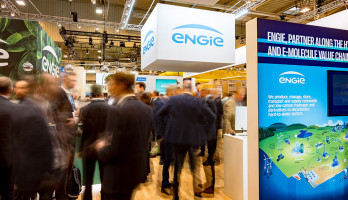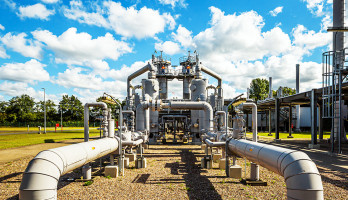
Municipal heating transition - a pressing issue and promising solutions
In the public perception of the energy transition, the focus is mostly on electricity, but another aspect is also currently being hotly debated in the truest sense of the word: Germany has committed to operating all heating networks in a climate-neutral manner by 2045 - and not just switching to renewable energies for electricity production. This means that in little more than 20 years, the heat supply should come from 100 percent greenhouse gas-free sources. This will be one of the most important steps into the new energy age. However, many of those responsible in local authorities feel left alone with this complex issue. We shed light on the background and explain what sensible practical approaches could look like.
Municipal heating transition: The challenge for those responsible on the ground
The municipal heating transition is an urgent task. The reason for this is the new German Heat Planning Act (WPG), which came into force on January 1, 2024. Since the beginning of the year, local authorities in Germany have been responsible for submitting plans for a climate-neutral heat supply within certain deadlines and then implementing them.
The new obligation is accompanied by the need for complex decisions and massive investments. The uncertainty is correspondingly high in many places. It is now right and important to develop appropriate supply concepts in collaboration with the local municipal utilities. However, decarbonization issues often pose challenges for existing utilities as well. Many utilities do not have the necessary financial resources, sufficiently qualified staff or the required experience in the field of renewable energies. These bottlenecks make it difficult to manage the heat transition independently and make it all the more important to rely on experienced partners and experts who can support municipalities in the implementation process.
The energy transition does not make things easy for those responsible in local authorities: until now, coal and gas have been the usual fossil fuels for municipal heat supply. A sustainable heat supply concept based on renewable energies, on the other hand, consists of modular solutions - for example solar thermal energy, wood chip heating, geothermal energy or heat pumps. This means that an individual system must be created, which must also be planned and implemented individually for each municipality.
The municipal heating transition in practice
In principle, those responsible in the municipalities are of course not left to their own devices. They can always ask for support from experts in the private sector. However, the energy transition in the municipal sector has a special feature in this respect: Due to procurement law processes, a new energy supply concept must be planned and implemented separately. This means that, as a rule, the planning office and the installer of the heat supply are two different companies. Although there are also exceptions under public procurement law, the two-person constellation of planner and installer is common.
A dilemma: when theory meets practice
This is precisely where the difficulty lies for the municipal heating transition. This is because the feasibility studies and concepts that planning offices and management consultancies draw up as a first step do not always take full account of the requirements of energy industry practice - both in technical and strategic terms. This makes the implementation part, which is ultimately what matters, an even greater challenge. The approaches developed often do not match what is technically and economically feasible.
Those responsible in the municipalities must be aware that the implementation part is the heart of the municipal heating transition. This can only work (in the long term) if the planning is practice-oriented and/or experienced energy experts review it again before implementation. A professional energy service provider is therefore the ace up your sleeve for the municipal heating transition. It's all about competence - and trust.
"When we advise those responsible for the heating transition, we don't do it online via Teams, we go see them - anywhere in Germany. That is our declared aim: we are on site and advise local authorities in person."
Axel Popp, Head of Heating Networks at ENGIE Deutschland
Taking a professional approach to the municipal heating transition
A partnership with a professional energy service provider is essential to ensure the implementation of heat supply concepts. The experts are on hand to provide advice and support local authorities in successfully putting heat planning into practice. Experience has shown that this is often necessary. Not all supply concepts developed for local authorities can be implemented. A good energy service provider therefore reviews all existing ideas and develops a practical solution that will work for many years and is economical.
What makes a good practice partner for the municipal heating transition
In any case, a good energy service provider demonstrates a great deal of sensitivity in the municipal heating transition. As a general rule, those responsible in local authorities should therefore make sure that they turn to a company that already has experience with the public sector.
- These companies are very familiar with public procurement law and can provide municipalities with fast and smooth support.
- Local service providers such as tradespeople, municipal utilities and the local population are happy to be involved. This creates a locally conceived municipal heat transition with all parties at the same table.
- With real drivers of the heating transition at their side, local authorities can even accelerate the planning and implementation. In many cases, a new turnkey heat supply solution can be implemented in three to four years.
The energy transition is not always met with enthusiasm by the local population in particular, especially when larger, external energy companies are involved. Many of those responsible in the municipalities know this only too well. Sensitivity is therefore on the agenda in the practical phase. Transparency and responsible stakeholder management on site are essential for the municipal heating transition. After all, regionality and independence form the brand essence of every municipality.
Modern partnership concepts for a rapid municipal heating transition
Modern energy partnerships that are worthwhile for local authorities are particularly interesting. Here, the energy service provider invests in the new technology together with the local authority. This means that the energy service provider invests its own money in the project and also invests in the new infrastructure. The municipalities thus reduce their own financial requirements and lower their investment and implementation risk.
The basis of such a partnership is a joint company that is founded specifically for the local municipal heating transition. Energy service providers take over the construction and operation of the heat supply systems, usually for 20 years. For the municipalities, this means that they don't have to worry about anything. At the end of the contract, local authorities can usually decide for themselves what to do next. The public sector can buy back the residual value, take over the operation and sale of the systems or extend the partnership - this is usually completely flexible.
Taking a decisive approach to the municipal heating transition
The new Heat Planning Act presents those responsible in local authorities with a mammoth task. However, with a practical focus and a competent partner, the challenge can be mastered. It is important to realize that the energy transition is not theoretical, but practical. This is why a competent partner is so important for implementation on site. As an energy service provider with many years of experience, ENGIE Deutschland is at the side of those responsible. The experts at ENGIE Deutschland will be happy to advise you. Find out more about a modern and climate-neutral heat supply!
Our Expert











